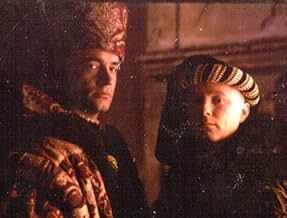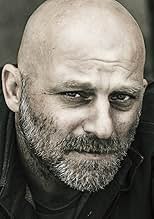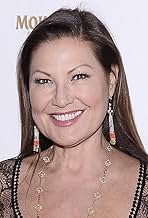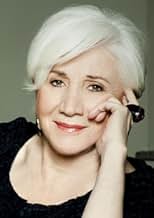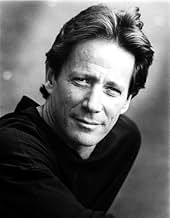ÉVALUATION IMDb
6,6/10
6,5 k
MA NOTE
Ajouter une intrigue dans votre langueSpurred by divine voices and visions, fifteenth century teen Joan d'Arc leads French forces against the English.Spurred by divine voices and visions, fifteenth century teen Joan d'Arc leads French forces against the English.Spurred by divine voices and visions, fifteenth century teen Joan d'Arc leads French forces against the English.
- A remporté 1 prix Primetime Emmy
- 15 victoires et 29 nominations au total
Parcourir les épisodes
Avis en vedette
In a stroke of good fortune for those of us who like a good historical religious story, this film and "Messenger" both came out in 1999. They are both excellent, both relate the same story, but in quite different ways. Here, Joan is depicted in the more traditional manner, a young girl who is both humble and headstrong in her wanting to follow God's will, and help set France free of the English. As I did for "Messenger", I rate this one a strong "8" of 10.
I own the DVD, and it is a very nice one. No extras, but the picture and sound, in ProLogic, are both excellent. The movie was originally broadcast as a "mini-series", as I recall, but the DVD is one continuous presentation 3 hours and 5 minutes long. However, there are no wasted scenes here, and the entire story is captivating.
To add a great touch of realism, much of the filming was obviously done in unheated churches and castles. As a result you can see the breath of the characters in the cold as they speak. It probably was really like that during the 1400s. Also, the colors chosen for the costuming remind me of the colors in old masters' paintings. The deep rose, muted royal blue, the earth tones, all added to the realism.
Leelee Sobieski really became Joan for this role. Plus, all the other veteran actors were in top form. There isn't any flaw in the film version of the story of Joan of Arc.
I own the DVD, and it is a very nice one. No extras, but the picture and sound, in ProLogic, are both excellent. The movie was originally broadcast as a "mini-series", as I recall, but the DVD is one continuous presentation 3 hours and 5 minutes long. However, there are no wasted scenes here, and the entire story is captivating.
To add a great touch of realism, much of the filming was obviously done in unheated churches and castles. As a result you can see the breath of the characters in the cold as they speak. It probably was really like that during the 1400s. Also, the colors chosen for the costuming remind me of the colors in old masters' paintings. The deep rose, muted royal blue, the earth tones, all added to the realism.
Leelee Sobieski really became Joan for this role. Plus, all the other veteran actors were in top form. There isn't any flaw in the film version of the story of Joan of Arc.
Yes. It wouldn't happen today, that's for sure, but it really did happen once upon a time in France, some 580 years ago. A nation managed to unite against an occupying power, inspired and led by a girl who responded to the request of her mysterious "voices" to do something about it when she was about seventeen years of age. Growing up in Domremy in what was then Lorraine, this girl clearly ended up quite the tomboy, typically dressed in jerkin, doublet and hose, her hair cropped short, ready upon instruction from her voices to don armour and wield the sword if necessary to raise France like a phoenix from the ashes. The film doesn't show this, but in Domremy she was called "Jeanette," when she arrived in France she was called "Joan," and in the actual transcripts of her trial she states, "as for my surname, I know of none," unlike the title of this film which borrows the popular English version of the name by which she is known today.
The story of Joan makes for a daring plot, and were it not for the fact that the transcripts of Joan's trial still indeed exist today -- making her one of the best known persons in history -- and attest to the events described as being most certain in fact, we might otherwise think such a story line to be quite incredible, if not simply ridiculous.
So let's make no mistake about it: Leelee Sobieski had the nerve to play one of the most riveting characters in history, a risky role that many a great actor has already played with determined success. Yet, like the powerful personage she portrays, Ms. Sobieski achieves a major victory in the final scheme of things. Not that Peter O'Toole didn't turn in his usual stunning performance, or that Ms. Sobieski wasn't also well-supported by Neil Patrick Harris, Maury Chaykin, Maximilian Schell, Shirley MacLaine, Chad Willet, and all under the fine direction of Christian Duguay, but let's face it -- it really boils down to being pretty much a one-kid show.
For a change, Hollywood really did this one right. Joan was a teenager, Joan should obviously be played by a teenager, and Leelee Sobieski was clearly the right kid for the job. Ms. Sobieski captured Joan's many contradictions brilliantly. With Joan, pious spirituality took its place along with a frisky charm, a sense of things serious and urgent often relaxed to humor and a sharp wit, the relentless pain of arrows that pierced her body was surely dulled by her thriving desire to live and her unfailing commitment to lead France to its place in a free world that she herself would sadly never see. Leelee Sobieski wove all of these into the highly textured character of Joan, not leaving a single aspect untouched, even though Joan's personality could occasionally disturb those of us who are far less saintly. Ms. Sobieski captured the spirit of a teenaged girl who actually led France to war in the 15th Century, and managed to create a crystalline character that convincingly showed us how that just might happen.
This film borrows freely from history but, to its credit, it thankfully doesn't borrow much of anything from the many previous films about Joan. Leelee Sobieski goes beyond being the best "Joan" in film so far. She so superbly plays the role that one could rightly say that she is the only Joan so far. For this reason alone, don't miss this film.
We don't know much about what Joan looked like, as no portraits or detailed descriptions of her were made from anyone who actually saw her during her short life. We don't know if Leelee Sobieski physically resembles the historical Joan or not and, since it seems we'll never know, it also doesn't matter. Joan was in her teens at her finest hour, Leelee is a teenager, and that's close enough. Furthermore, there are so many interesting facts pertaining to Joan's life, her character, her family, her friends, her enemies, the logistics of the battles, and so forth and so on, that a film would need to go on for hours to even begin to capture most of it, so I think it's quite fair to forgive the film's several omissions. If viewers are inspired to know more about Joan (and after seeing this film they certainly should be), then I'd recommend perusing Regine Pernoud's book entitled, "Joan of Arc by Herself and Her Witnesses," (Scarborough House; Lanham, Maryland; 1994), still considered by many to be the best written work on the subject.
One final and perplexing thought: the mini-series "Joan of Arc" is but one of several films on this character that are being produced within the span of only a couple of years. It almost seems as though Joan (after several hundreds of years have gone by) has somehow caught our imagination as we approach the end of the millenium. Perhaps in our uncertain times when heros seem to be in short supply, we somehow hope that the spirit of a young teenage girl from 15th Century France will guide us and lead us to freedom as we enter upon a new age in history. At any rate, aside from mere coincidence, I just don't know quite how else to explain this phenomenon.
The story of Joan makes for a daring plot, and were it not for the fact that the transcripts of Joan's trial still indeed exist today -- making her one of the best known persons in history -- and attest to the events described as being most certain in fact, we might otherwise think such a story line to be quite incredible, if not simply ridiculous.
So let's make no mistake about it: Leelee Sobieski had the nerve to play one of the most riveting characters in history, a risky role that many a great actor has already played with determined success. Yet, like the powerful personage she portrays, Ms. Sobieski achieves a major victory in the final scheme of things. Not that Peter O'Toole didn't turn in his usual stunning performance, or that Ms. Sobieski wasn't also well-supported by Neil Patrick Harris, Maury Chaykin, Maximilian Schell, Shirley MacLaine, Chad Willet, and all under the fine direction of Christian Duguay, but let's face it -- it really boils down to being pretty much a one-kid show.
For a change, Hollywood really did this one right. Joan was a teenager, Joan should obviously be played by a teenager, and Leelee Sobieski was clearly the right kid for the job. Ms. Sobieski captured Joan's many contradictions brilliantly. With Joan, pious spirituality took its place along with a frisky charm, a sense of things serious and urgent often relaxed to humor and a sharp wit, the relentless pain of arrows that pierced her body was surely dulled by her thriving desire to live and her unfailing commitment to lead France to its place in a free world that she herself would sadly never see. Leelee Sobieski wove all of these into the highly textured character of Joan, not leaving a single aspect untouched, even though Joan's personality could occasionally disturb those of us who are far less saintly. Ms. Sobieski captured the spirit of a teenaged girl who actually led France to war in the 15th Century, and managed to create a crystalline character that convincingly showed us how that just might happen.
This film borrows freely from history but, to its credit, it thankfully doesn't borrow much of anything from the many previous films about Joan. Leelee Sobieski goes beyond being the best "Joan" in film so far. She so superbly plays the role that one could rightly say that she is the only Joan so far. For this reason alone, don't miss this film.
We don't know much about what Joan looked like, as no portraits or detailed descriptions of her were made from anyone who actually saw her during her short life. We don't know if Leelee Sobieski physically resembles the historical Joan or not and, since it seems we'll never know, it also doesn't matter. Joan was in her teens at her finest hour, Leelee is a teenager, and that's close enough. Furthermore, there are so many interesting facts pertaining to Joan's life, her character, her family, her friends, her enemies, the logistics of the battles, and so forth and so on, that a film would need to go on for hours to even begin to capture most of it, so I think it's quite fair to forgive the film's several omissions. If viewers are inspired to know more about Joan (and after seeing this film they certainly should be), then I'd recommend perusing Regine Pernoud's book entitled, "Joan of Arc by Herself and Her Witnesses," (Scarborough House; Lanham, Maryland; 1994), still considered by many to be the best written work on the subject.
One final and perplexing thought: the mini-series "Joan of Arc" is but one of several films on this character that are being produced within the span of only a couple of years. It almost seems as though Joan (after several hundreds of years have gone by) has somehow caught our imagination as we approach the end of the millenium. Perhaps in our uncertain times when heros seem to be in short supply, we somehow hope that the spirit of a young teenage girl from 15th Century France will guide us and lead us to freedom as we enter upon a new age in history. At any rate, aside from mere coincidence, I just don't know quite how else to explain this phenomenon.
I had to write a comment after reading the previous one. I found this to be a very refreshingly straightforward rendition of the Joan of Arc story that taught me, as one who only knows the story from movies, a great deal about the political and social realities at the time, including the hunger for real leadership and real spiritual authority. Not too different from our own times now.
Apparently a great deal of research was done, including a thorough reading of the transcripts of Joan's actual trial in the original French, to get both the setting and Joan's personality right. And I think it shows. It certainly held my interest, and nothing about its budget distracted me.
Plus they did not make her a complete victim - she knew enough to go willingly to the stake. And that's a courageous move on the part of the film's creators which adds that final necessary element of spiritual integrity. Enough so I willingly cried many times through it without feeling manipulated... these matters of soul and spirit felt real to me, and for a skeptical Scorpio like me that's high praise for work well done.
Apparently a great deal of research was done, including a thorough reading of the transcripts of Joan's actual trial in the original French, to get both the setting and Joan's personality right. And I think it shows. It certainly held my interest, and nothing about its budget distracted me.
Plus they did not make her a complete victim - she knew enough to go willingly to the stake. And that's a courageous move on the part of the film's creators which adds that final necessary element of spiritual integrity. Enough so I willingly cried many times through it without feeling manipulated... these matters of soul and spirit felt real to me, and for a skeptical Scorpio like me that's high praise for work well done.
There are few movies that bring me to tears. Epic movies such as "The Mission" and "Braveheart" succeeded in that. However "Joan of Arc" surpassed them all. I taped the mini-series, and it is the only movie that has me sobbing EVERY SINGLE TIME I watch it. Coming from an actor, this is wonderfully written and beautifully acted by Peter O'Toole, Neil Patrick Harris (far from his Doogie Howser days!), Chad Willet, and, of course, Leelee Sobieski. She didn't play the Maid of Lorraine...she WAS the Maid of Lorraine. I give credit to the people behind the musical score, it fits the movie perfectly, and 12-year old Charlotte Church's vocals were just the thing for the battle scenes. This is one movie I will cherish always.
Do great times call forth grand souls or do grand souls change great events or both? Joan's World - Historical Background. It was a time when the English crown controlled huge territories in France - and not by way of some invasion or occupation, but as the direct result of the fact the English King, Henry IV, (also Duke of Lancaster) and his son Henry V (both of Shakespeare fame)were descendants of the original French Duke of Normandy, William, who had conquered England in 1066 and thus the King of England continued to remain the feudal "owner" of Normandy, Brittainy and Acquitaine. This English King, Henry V would stake the biggest claim and actually force the King of France to appoint this same English King, his "lawful" successor to the French throne.
Combine this with the fact the the English had a willing French ally in the form of Charles, Duke of Burgundy who was a rival for the French crown. Its no surprise that the Burgundians were the bully boys of this era. They were allies of the English and thus their French-speaking local "enforcers." The English would control these areas for over 300 years. The "Hundred Years War" would be fought to maintain that English control.
So at the time of this story, the Dauphine of France, the weak French prince Charles was not yet the crowned King of France and controlled only a fraction of the country. Even he saw his chances for the crown as limited. Another Charles, the Duke of Burgundy, France, was far more powerful than the Dauphine and to offset his limited powers, Burgandy had allied themselves with the English.
It was into this was brutal world, that Joan of Arc was born. A savage time of "might makes right" and a nobility class-sanctioned brutalization of a citizen population caught in a titanic chess match as pawns between a class of nobles who, although they had taken ancient oaths sworn to guard the defenseless, nevertheless preyed on the very people they were sworn to defend.
There are parallels to many parts of the world where so-called "war lords" have re-imposed a modern-day feudalism of protectors and protected.
Joan was inspired, (and just by what/who, remains a hotly debated theological and psychological discussion to this day) to free France of English domination. Why? Catholics might argue that she was called to this by God in order to preserve France as a bastion of Catholicism against the invading "heresy" of the Protestant Revolution. Think how events might have turned out if England had conquered all of France and imposed Protestantism on France.
Historical Sequel to Joan of Arc.
Henry V would die in France of a fever and never assert this claim. With Joan's military successes as precedents, and the Duke of Burgandy eventually abandoning his English allies, Henry V's son, Henry VI, a weak-willed but pious monarch, would be VERY unsuccessful in asserting any of his father Henry V's claims even though another war, the "Thirty Years" war would be fought by Henry VI's dukes to try to take back lost regions. The English would eventually lose that war and surrender, city by city, castle by castle, the entire regions of Normandy and Aquitaine back to the French. Ultimately, the Ennglish would control only the port city of Calais before losing that last foothold on the Continent. A new war in England, a civil war between the houses and Dukes of York and Lancaster would be fought, in part, from the failures of the Lancastrian King, Henry VI to keep those hard-fought territories - "The War of the Roses."
Now why is the movie great? Because it faithfully captures the life of a illiterate and simple peasant girl, called by unseen forces to change the world around her in direct conflict with the brutality, the conflict, the religious zeal/fanaticism and the lust for power of he times into which Jean D'Arc was born into.
If you don't know much about either Joan or the times, you learn a great deal from this wonderful movie. Joan was on a "mission from God," at least to her way of thinking and the religious forces of her day in the form of the Church hierarchy were dumbfounded initially and enraged, eventually that some "mere girl" would dare to tell them anything about God's will for either herself, let alone her King and country.
The Maid of Orleans' life is a testament to one person, even a unschooled young girl's in an age of female political impotence to change events on a grand scale.
Combine this with the fact the the English had a willing French ally in the form of Charles, Duke of Burgundy who was a rival for the French crown. Its no surprise that the Burgundians were the bully boys of this era. They were allies of the English and thus their French-speaking local "enforcers." The English would control these areas for over 300 years. The "Hundred Years War" would be fought to maintain that English control.
So at the time of this story, the Dauphine of France, the weak French prince Charles was not yet the crowned King of France and controlled only a fraction of the country. Even he saw his chances for the crown as limited. Another Charles, the Duke of Burgundy, France, was far more powerful than the Dauphine and to offset his limited powers, Burgandy had allied themselves with the English.
It was into this was brutal world, that Joan of Arc was born. A savage time of "might makes right" and a nobility class-sanctioned brutalization of a citizen population caught in a titanic chess match as pawns between a class of nobles who, although they had taken ancient oaths sworn to guard the defenseless, nevertheless preyed on the very people they were sworn to defend.
There are parallels to many parts of the world where so-called "war lords" have re-imposed a modern-day feudalism of protectors and protected.
Joan was inspired, (and just by what/who, remains a hotly debated theological and psychological discussion to this day) to free France of English domination. Why? Catholics might argue that she was called to this by God in order to preserve France as a bastion of Catholicism against the invading "heresy" of the Protestant Revolution. Think how events might have turned out if England had conquered all of France and imposed Protestantism on France.
Historical Sequel to Joan of Arc.
Henry V would die in France of a fever and never assert this claim. With Joan's military successes as precedents, and the Duke of Burgandy eventually abandoning his English allies, Henry V's son, Henry VI, a weak-willed but pious monarch, would be VERY unsuccessful in asserting any of his father Henry V's claims even though another war, the "Thirty Years" war would be fought by Henry VI's dukes to try to take back lost regions. The English would eventually lose that war and surrender, city by city, castle by castle, the entire regions of Normandy and Aquitaine back to the French. Ultimately, the Ennglish would control only the port city of Calais before losing that last foothold on the Continent. A new war in England, a civil war between the houses and Dukes of York and Lancaster would be fought, in part, from the failures of the Lancastrian King, Henry VI to keep those hard-fought territories - "The War of the Roses."
Now why is the movie great? Because it faithfully captures the life of a illiterate and simple peasant girl, called by unseen forces to change the world around her in direct conflict with the brutality, the conflict, the religious zeal/fanaticism and the lust for power of he times into which Jean D'Arc was born into.
If you don't know much about either Joan or the times, you learn a great deal from this wonderful movie. Joan was on a "mission from God," at least to her way of thinking and the religious forces of her day in the form of the Church hierarchy were dumbfounded initially and enraged, eventually that some "mere girl" would dare to tell them anything about God's will for either herself, let alone her King and country.
The Maid of Orleans' life is a testament to one person, even a unschooled young girl's in an age of female political impotence to change events on a grand scale.
Le saviez-vous
- AnecdotesJoan of Arc was left-handed.
- GaffesAfter examining plague victims, Joan uses flaming alcohol to sterilize her hands. However, the existence of micro-organisms and their connection to disease was not known at that time - in fact, hand-washing did not become common medical practice until 500 years later.
- Citations
Bishop Cauchon: Poor, deluded Joan. She has no idea she has put a monster on the throne. Those are my last words as Your Majesty's spiritual advisor.
- Autres versionsThe DVD (180 minutes) is the complete miniseries, as it contains 40 minutes cut from the VHS, which is 140 minutes.
- ConnexionsFeatured in The 51st Annual Primetime Emmy Awards (1999)
- Bandes originalesPanis Angelicus
Written by César Franck
Arranged by Julian Smith
Performed by Charlotte Church
Courtesy of Sony Music Entertainment (UK) Ltd.
Meilleurs choix
Connectez-vous pour évaluer et surveiller les recommandations personnalisées
- How many seasons does Joan of Arc have?Propulsé par Alexa
Détails
- Date de sortie
- Pays d’origine
- Site officiel
- Langues
- Aussi connu sous le nom de
- Joan of Arc
- Lieux de tournage
- sociétés de production
- Consultez plus de crédits d'entreprise sur IMDbPro
Contribuer à cette page
Suggérer une modification ou ajouter du contenu manquant

Lacune principale
By what name was Jeanne d'Arc (1999) officially released in India in English?
Répondre


